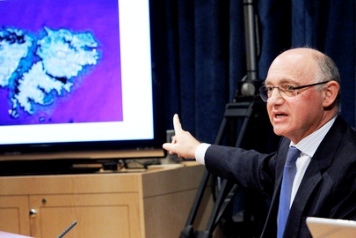
Argentina's foreign minister wants the United Nations to mediate with Britain over the Falkland Islands (Malvinas) and accused London of militarizing the south Atlantic. "Rubbish," responded Britain's ambassador.
Just when you thought the world had enough problems, there was a bit of a time warp. Foreign Minister Héctor Timerman and UK Ambassador Mark Lyall Grant traded verbal salvos in dueling U.N. press conferences close to the 30th anniversary of the 10-week Falklands war that began on April 2, 1982.
But the conflict, in which 900 people (649 Argentines, 255 Britons, all military personnel) is no laughing matter for both countries, not to mention the 2,500-3,000 people on the barren, wind-swept islands.
Using charts and graphs and distributing every story in British papers that would bolster his case, Timerman said Britain had five military bases in the South Atlantic, submarines carrying nuclear weapons and controlled maritime traffic and access to the Pacific and Indian Oceans. It could strike Argentina, Uruguay, Chile and southern Brazil.
The region is the "last refuge of a declining power," he said. "Britannia rules only applies in the South Atlantic"
Nuclear weapons or?
"Are there nuclear weapons or are there not? The information Argentina has is that there are these nuclear weapons," Timerman said, speaking through a translator.
He said the deployment of nuclear arms would violate the Treaty of Tlatelolco for the Prohibition of Nuclear Weapons in Latin America and the Caribbean that created a nuclear-free zone in the region. Britain has signed the treaty.
Lyall Grant, while dismissing Britain's domination of the ocean as "manifestly absurd, said: "We do not comment on the disposition of nuclear weapons, submarines, etc., but it is well known that, of course, as part of our overall deterrence posture there are submarines on patrol all around the world at any time." He said Britain had only two bases in the South Atlantic.
The odds against renewed fighting are negligible. But Argentina can put a commercial squeeze on the territory and close its air space to the only weekly commercial flight out of the islands to Chile.
Defend robustly
"We have not started a war of words, but clearly if there is an attempt to take advantage of the 30th anniversary of the Falklands War by Argentina, then we will obviously defend our position and defend it robustly," Lyall Grant said.
Timerman lodged a protest to the presidents of the U.N. General Assembly and the Security Council as well as Secretary-General Ban Ki-moon, who hoped "Argentina and the United Kingdom can avoid escalating their dispute over the Falkland Islands (Malvinas) and resolve their differences through dialogue." He offered to facilitate such a dialogue but little U.N. action is expected.
Lyall Grant said London was open to talks with Argentina but there was no need for "third-party mediation." Issues such as the environment and fishing rights could be on the agenda but not the sovereignty of the islands unless its residents want it.
The British ambassador maintained his nation had controlled the islands well before Argentina was independent, although there is a dispute on the discovery and colonization of the territory by Britain, France and Spain.
Why Argentina's president, Cristina Fernández de Kirchner, an extremely popular leader, has made Las Malvinas a major issue of her second term is unclear. Particularly annoying to the president was the assignment of Prince William, second in line to the British throne, to the Falklands as part of his flight training.
The Guardian newspaper speculated that one reason was her roots in Patagonia, which cares more about the issue than cosmopolitan Buenos Aires. It also wondered if Kirchner wanted a change in the constitution so she could run for a third term - or to deter successor from moving too soon. And there is a new anti-colonialist spirit in Latin America, challenging perceived or actual Western imperialism.
Timerman, a famous name
Timerman is just not any foreign minister. He came to the United States as an exile in 1978 after his father, Jacobo Timerman, was imprisoned and ruthlessly tortured for 30 months by anti-Semitic soldiers, part of the ruling military that engineered the invasion of the Falklands.
I visited Buenos Aires as a Reuters editor shortly after Raúl Alfonsín was elected president in 1983. I watched a demonstration by ridiculously young war veterans, some of them maimed, asking for compensation. They were followed by the Mothers of the Disappeared (Asociación Madres de Plaza de Mayo) silently holding pictures of their children who vanished during the "Dirty War" (Guerra Sucia). The defeat in the Falklands-Malvinas precipitated the collapse of the junta.
Argentina's Timerman at UN press conference, UN photo

